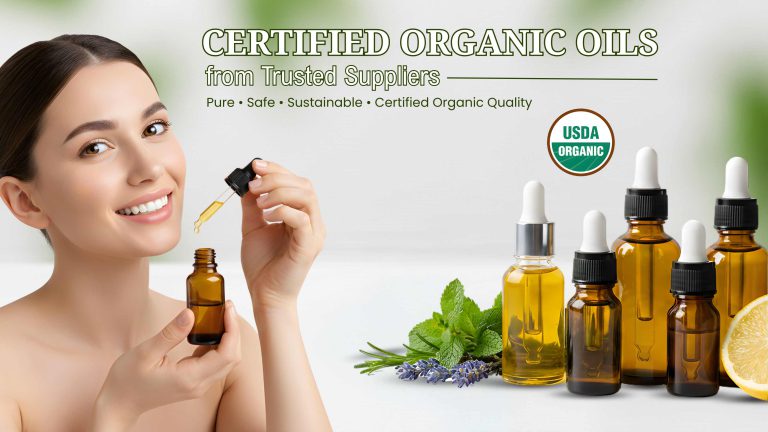Table of Contents:
- Bergamot Essential Oil: All You Need To Know
- A Comprehensive Guide
- History
- Production
- Extraction Process
- The different varieties of bergamot essential oil
- Factors that can affect its quality.
- Market Analysis- Industry Size
- Bergamot Oil Benefits
- How to use it?
- Bergamot oil Side Effects, Warnings
- Conclusion
Introduction
Bergamot essential oil has been a trusted natural remedy and fragrance ingredient for centuries. This plant-based oil is widely used in the European cosmetics industry and has also played an important role in Asian cultures. From traditional medicines and fragrant foods to perfumes, the uses of bergamot oil have made it highly valuable across the world.
It not only adds a refreshing aroma but also supports health by relieving sore throats, soothing acne, easing stomach pain, and boosting immunity. In this comprehensive guide, we will explore its history, production, extraction process, varieties, benefits, uses, market size, and side effects.
History of Bergamot Essential Oil
The origins of bergamot (Citrus bergamia) trace back to Southeast Asia. However, the fruit found its true fame in Calabria, Italy, where it has been cultivated since the 16th century.
Initially, bergamot fruits served as ornamental plants in the homes of Italian aristocrats. Later, they became part of traditional Italian medicine, treating fever, sore throats, and digestive problems. Today, bergamot trees grow in countries like France and Turkey, but the Calabrian coast of Italy remains the most renowned source of high-quality bergamot essential oil for perfumery and cosmetics.
Buy Organic And Natural Essential Oil In Bulk
Production of Bergamot Essential Oil
Bergamot fruit thrives in the Mediterranean region, especially in warm climates with plenty of sunshine. Italy leads global production, with over 95% of the world’s cold-pressed bergamot oil coming from Reggio Calabria in Southern Italy.
Bergamot essential oil manufacturers primarily cultivate the plant for its aromatic peel rather than for direct fruit consumption. Although France and Turkey also produce it, oils from Calabria are still considered the finest.
Extraction Process of Bergamot Essential Oil
The extraction of bergamot oil has evolved from traditional methods to more advanced techniques. Currently, four main processes are used:
1. Cold Pressing
Cold pressing, also known as hydraulic pressing, is the most common method. The rinds are mechanically pressed under high pressure, yielding a pure oil that retains its original aroma, flavor, and nutrients.
2. Steam Distillation
In this method, steam passes through the fruit rinds, separating the oil. While it produces higher yields, the aroma may not be as rich as cold-pressed oil.
3. Solvent Extraction
Here, the rinds soak in a solvent for about 24 hours. This method produces bergamot absolute and ensures no valuable oil components are destroyed.
4. CO2 Extraction
CO2 extraction uses pressurized carbon dioxide at high temperatures to obtain a concentrated, high-quality oil. This advanced technique is effective but more expensive.
The Different Varieties of Bergamot Essential Oil
Bergamot essential oil manufacturers gave us this versatile plant. The oil extracted from the bergamot fruit peels comes in five main varieties:
Bergamot (Calabrian) Essential Oil
Rich in antioxidants and flavonoids, this variety helps with sore throats, pain relief, skin disinfection, and weight loss. It has a sweet, warm citrus scent.
Standard Bergamot Oil
This is the most popular type used in food, cosmetics, perfumery, and aromatherapy. It uplifts mood, reduces stress, promotes relaxation, and deodorizes spaces.
Bergamot Mint Oil
Derived from Mentha Citrata through steam distillation, it offers stress relief, acne prevention, and immune support. It has a minty aroma similar to peppermint.
Bergamot Sicilian Essential Oil
Cold-pressed from peels in Italy, this type relieves pain, aids digestion, and uplifts mood. With limonene and linalool as key compounds, it has a sweet, neroli-like fragrance.
Market Analysis – Industry Size
.jpg)
The global market for essential oils, including bergamot essential oil, is valued at $21.1 billion and is projected to reach $31.5 billion by 2027, growing at a CAGR of 8.8%.
The pharmaceutical, personal care, and cosmetics industries drive this demand. By 2027, organic bergamot oil alone is expected to account for 64% of the global market, showing the rising preference for natural and organic ingredients.
Factors That Affect the Quality of Bergamot Essential Oil
1. Storage
This oil should be stored at room temperature (8–30°C) in airtight, dark-colored bottles. Exposure to sunlight and oxygen reduces quality through oxidation.
2. Extraction Method
Cold pressing best preserves its aroma and nutrients, while steam distillation offers faster results for bulk production. Choosing the right method directly impacts oil quality.
Bergamot Essential Oil Benefits:
It offers numerous health and wellness benefits:
- Reduces acne and scars – Its antibacterial and antioxidant properties fight bacteria and inflammation.
- Relieves pain – Known for its analgesic and anti-inflammatory effects.
- Reduces stress and anxiety—Aromatherapy with bergamot oil promotes relaxation.
- Stimulates hair growth – Improves scalp blood flow and strengthens hair.
- Promotes healing – Supports faster recovery from infections.
- Improves digestion – Stimulates digestive juices for better nutrient absorption.
- Relieves headaches – Reduces muscle tension when massaged on the neck.
- Boosts circulation – Enhances oxygen flow and heart function.
- Acts as a natural deodorant – Fights odor-causing bacteria.
- Balances hormones – Encourages endorphin production for improved mood.
Spiritual Benefits of Bergamot Essential Oil
Beyond physical health, this oil is also valued for spiritual well-being. It helps calm the mind, balance emotions, boost energy, cleanse the aura, and support meditation.
Many practitioners use it for chakra alignment, particularly the solar plexus chakra (Manipura), which governs confidence, willpower, and self-esteem.
How to Use Bergamot Essential Oil
1. Inhalation
Add a few drops to a diffuser or humidifier to promote relaxation and better sleep.
2. Massage Oil
Dilute with a carrier oil like almond or lavender oil and use for full-body massages.
3. Infused Bath
Mix 1–2% of this oil in bathwater for relaxation and antibacterial effects.
4. Topical Application
Dilute and apply directly to the skin to treat acne, rashes, or scars.
Side Effects and Warnings
Although generally safe, bergamot essential oil should be used with care:
- Avoid use during pregnancy and breastfeeding.
- Always dilute before topical use to prevent irritation.
- Conduct a patch test to rule out allergies.
- Consult a doctor before using it for medical conditions.
Conclusion:
It is a versatile natural product with powerful therapeutic, cosmetic, and spiritual benefits. From reducing stress and boosting mood to promoting healthy skin and supporting spiritual practices, its applications are vast. For businesses and individuals, buying essential oil in bulk ensures access to high-quality oil at competitive prices. Aromaaz International, as a top natural essential oil supplier, offers organic and pure products trusted worldwide. Embrace the natural power of bergamot essential oil to enhance wellness, beauty, and overall well-being.




